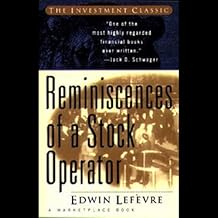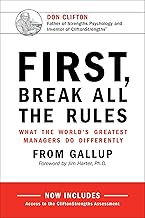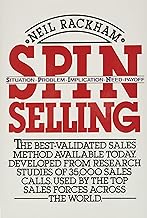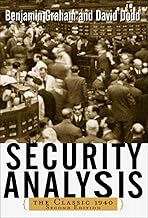
So Good They Can't Ignore You: Why Skills Trump Passion in the Quest for Work You Love
Cal Newport, Dave Mallow, et al.
4.5 on Amazon
37 HN comments

The Richest Man in Babylon: Original 1926 Edition
George S. Clason , Charles Conrad, et al.
4.7 on Amazon
37 HN comments

Basic Economics
Thomas Sowell
4.8 on Amazon
35 HN comments

Reminiscences of a Stock Operator
Edwin Lefevre, Rick Rohan, et al.
4.6 on Amazon
35 HN comments

First, Break All the Rules: What the world's Greatest Managers Do Differently
Jim Harter, Marcus Buckingham , et al.
4.6 on Amazon
34 HN comments

Venture Deals: Be Smarter Than Your Lawyer and Venture Capitalist
Brad Feld and Jason Mendelson
4.7 on Amazon
31 HN comments

Delivering Happiness
Tony Hsieh
4.6 on Amazon
30 HN comments

SPIN Selling
Neil Rackham
4.5 on Amazon
30 HN comments

Nickel And Dimed: On (Not) Getting By In America
Barbara Ehrenreich
4.3 on Amazon
29 HN comments

The Five Dysfunctions of a Team: A Leadership Fable
Patrick Lencioni
4.6 on Amazon
28 HN comments

The Startup Owner's Manual: The Step-By-Step Guide for Building a Great Company
Steve Blank and Bob Dorf
4.5 on Amazon
27 HN comments

Give and Take: A Revolutionary Approach to Success
Adam M. Grant PhD, Brian Keith Lewis, et al.
4.6 on Amazon
25 HN comments

Titan: The Life of John D. Rockefeller, Sr.
Ron Chernow
4.7 on Amazon
23 HN comments

The Challenger Sale: Taking Control of the Customer Conversation
Matthew Dixon and Brent Adamson
4.5 on Amazon
22 HN comments

Security Analysis: Principles and Techniques
Benjamin Graham and David Dodd
4.7 on Amazon
22 HN comments
hgrttnonNov 3, 2014
I have heard great things about "First, break all the rules" but haven't read it.
Good luck on your management adventure.
tboyd47onJan 6, 2018
tboyd47onJan 15, 2018
xstaticdevonFeb 3, 2011
Good to Great by Jim Collins
One Minute Manager by Ken Blanchard
First, Break All The Rules by Marcus Buckingham and Curt Coffman
7 Habits of Highly Effective People by Stephen Covey
In Search of Excellence by Tom Peters
btillyonDec 20, 2012
Spooky23onDec 17, 2016
Everything in the book is based by longitudinal surveys done over several decades everywhere from Burger King to the Army to tech companies.
arupchakonApr 23, 2012
Remember not to just accept everything in these books. They should be read with the expectation that you will have to pull out the useful pieces that are relevant to you.
winridonJan 4, 2019
Learn how to give context without accusing or instructing.
Learn about the different types of management.
Read: First, Break All The Rules.
jrs235onAug 13, 2014
jsmcgdonMar 13, 2008
Its a fun read if nothing else. It contains a lot of counter convention logic that would be right at home in one of PG's essays.
jrileyonJuly 27, 2011
Most helpful book to me has been the Gallup research detailed in "12" or "First Break All The Rules". Important piece is the twelve principles of job satisfaction/performance: your employees know what's expected of them, have tools to do their job, have a buddy at work, etc.
Could also try Harvard Business Reviews on Leadership.
Example:
http://www.amazon.com/HBRs-Must-Reads-Leadership-ebook/dp/B0...
Or blogs:
http://www.realsoftwaredevelopment.com/the-one-minute-softwa...
btillyonMar 10, 2010
btillyonDec 17, 2009
To avoid this problem they recommend giving people promotion possibilities within job roles AND requiring that moving into management always come with a pay cut to make people honest about whether they are seeking the job because they think they would be good at it, or because they want a raise. (A manager who is good would likely make up the pay cut with interest over time.)
Spooky23onJan 15, 2018
Also, just be you. People see potential in you and how you work. Don’t surrender your soul to management books — management is like organization, there’s lots of “management porn” that makes it easy to procrastinate through reading. Most of the guidance you see is ego-driven and conflicting.
The indirect thing you should consider working on that was hard for me and many other tech people is networking and relationship building. I’m at a director level position now, and my ability to pick up the phone and have someone do something is an increasingly important part of my job. Making that happen is time and work.
late2partonMay 15, 2015
Another great book on management in general is "First, Break All The Rules" by Buckingham et.al. from Gallup - http://www.amazon.com/First-Break-All-The-Rules/dp/074351011...
The important thing is not to dance a prescribed routine, but to be effective with the human individuals. Use known patterns as starts, and adjust as needed.
I think the first thing to do is discuss the business or user need. Then scope out phases or milestones. Then assign leaders to each area and give them time to think. Scope out timelines and get started - but adjust frequently and sync up on progress.
Good luck!
sorumonNov 4, 2019
- People join companies for the vision, brand, comp etc...but they leave because of their direct manager
- The direct manager determines how long an employee stays and how productive he/she is during their tenure
The 2 main parts of the book look at:
a) how you attract and retain the most talented employees, what things matter to them the most (compensation didn't make the cut)
b) traits of great managers
Book still holds up, worth a read: https://www.goodreads.com/book/show/50937.First_Break_All_th...
ci5eronAug 20, 2019
IIRC, the book "First, Break all the Rules" actually challenged the "Good to Great" methodology a bit on this point.
(The other point, IIRC, was that first you have to find the right questions, before the right answers can be considered).
Spooky23onMar 16, 2018
Basically, they correlated about 20 questions that were predictive of job performance across many different verticals, from the Air Force to McDonalds to software.
The most successful managers cultivated environments where employees are friends, and generally weren’t lonely. There were other interesting factors too. It’s worth reading.
deodaronJuly 27, 2020
I personally learned a lot from "First, Break All the Rules: What the World's Greatest Managers Do Differently" (ISBN: 978-1531865207). The key idea is to not try and change the basic nature or capabilities of any person but to give them tasks that help them showcase their natural strengths. This may not always be possible.
I have found this idea to bear out in my experience. If you try to make a cat bark, it will result in a lot of frustration for both you and the cat. Personal growth and learning is a long, difficult journey and you as a manager can only give ideas or hints. You cannot mold your reports' nature or style of working.
tillyonAug 3, 2009
My point of view is informed by the book, First, Break All The Rules. That started as a study by the Gallup organization on what divides great managers from normal ones. They learned that great managers implicitly understand that people have skills and talents. Skills, like how to drive a car, you can teach. But you can't remain focused on the road for hours, enjoy doing data entry, or make someone feel listened to without having a talent for it. And grownups are too hard to change to make it worthwhile finding talents they don't have. So it is best to make people productive by shaping jobs to their individual talents, and not by trying to "grow" them into people they aren't.
So I absolutely agree that world class performers enjoy performing at that level. You don't reach that level without having a talent, and you don't develop that talent without being wired to find pleasure in what you do. But that's better thought of as a way of recognizing existing talents than as a way to change people.
skmurphyonOct 20, 2008
wolframarnoldonFeb 6, 2013
Here's the Amazon link: http://www.amazon.com/First-Break-All-Rules-Differently/dp/0...
tboyd47onOct 3, 2019
I viewed the Agile Manifesto as a sacred text of software development for most of my career. Eventually, I came to understand that this is not a sacred text but a golden calf. It's just a gentleman's agreement between consultants not to interfere with each other's snake oil. It's not a misunderstood document; it simply wasn't intended to be understood.
jalancoonJan 5, 2013
This may seem obvious, but I've seen that a hiring manager will often hire a candidate with an unsuccessful record on the believe that, for the first time in the candidate's career, he/she will be successful in the new organization, (yes, I've done this myself also), only to be disappointed later. In fact, this pattern is really very common in my experience.
intelliderponFeb 28, 2019
It is sourced from a lot of quality data collected by Gallup and the wisdom boils down to 3 practices:
1) Give everyone the tools they need to do the job.
2) Get out of their way.
3) Don't try to force equal performance across your team. You won't achieve it and it will alienate people.
btillyonAug 29, 2012
The issue is that we have to work with the limitations that come from the people we happen to be, not the people we wish we were. If something has happened during an interview that makes you actually angry, and you stay in a stressful situation for several hours following, it is extremely likely that your anger will come out in a bad way. If this is your situation then leaving, despite being bad, is the least harmful thing that you could do.
Yes, it is convenient not to get angry. Yes, it is wonderful to keep a professional face and pleasant demeanor no matter what may have happened in the interview. But we are humans. We have human limitations. If your limitations have been exceeded, the sooner you recognize and cope with that, the less likely you are to do something you will really regret. And getting space is one of the best techniques available to us. If that means leaving the interview, so be it.
Now you may agree and immediately say that this is a personal limitation that should be fixed ASAP. I strongly disagree. I recommend reading First, Break All The Rules. We're talking about a personality trait here. In adults, trying to change your personality is usually a lost cause. For most people it is FAR more effective to find ways to structure your environment so that you play to your strengths rather than your weaknesses.
So try to keep an even keel. Avoid argument. And if, in the stress of an interview, you get angry, try to get space. If need be, ask if you can have a few minutes alone in a room to collect your thoughts. But if you can't get that, and fear you'll do something you regret, you're probably right. In that situation, exiting the interview may be your best remaining option. (But note that best does not mean good.)
eengstromonMar 21, 2011
Do yourself a favor, order a bunch of used copies for your staff to read. I've probably bought 200 or more copies of this book new and used and no other single book published in the micro-computing era has shaped my thinking more about running an organization.
I will add that starting from a good base of effective working culture, then working on culture as a theme will yield significant benefit.
btillyonMar 11, 2017
A common attitude of effective managers as documented by First, Break All The Rules can be summed up by, "I never waited too long to make the right hire. I never fired the wrong one quickly enough." Having the wrong employee is very toxic for your organization and culture.
The rules that Steve laid out do not actually put pressure on people. They amount to, "Be accountable for what you say, try to make it work, and let people know quickly once you hit a roadblock." It is about effort and communication, not achieving results.
People who don't put in effort and don't communicate can't be made to, and can't stay. But people who do, can. And, on average, this will work out well.
tboyd47onJan 30, 2019
There will always be high performers and low performers on a team, both in a relative and absolute sense. Good managers don't make it their responsibility to close that gap; they just make it clear what the goals are, fill the team with self-motivated people, and provide the tools and environment to get the work done. And yes, you fire people if they don't meet a clear minimum level of performance, but don't make that an expectation out of the gate. Even if you cut all the "low performers" and double the "high performers'" pay, those people can burn out or get sick and suddenly turn into low performers. "First, Break All the Rules" is a great book on this topic.
sgentleonJune 5, 2011
I would recommend Drive by Dan Pink if you're interested in learning more about creative motivation. It's pretty short, and actually very well summarised here: http://www.youtube.com/watch?v=u6XAPnuFjJc
Peopleware by Tom DeMarco and Timothy Lister is very good programmer-specific management material. They cite a lot of work benchmarking the productivity of different workplaces, so it's very "x is good, x is bad".
Jim Collins' Good to Great is an examination of businesses that succeed vs fail, and the attributes that get them there, it's essentially an extended summary of a longitudinal study he and his team did of businesses that outperformed the stock market by a high factor over 10 years. It's more leadership than management, but still very useful.
One that I haven't read yet (damn my stupidly big reading list) but recommend on reputation alone is First, Break All The Rules by Marcus Buckingham and Curt Coffman. Here's a summary: http://www.slideshare.net/gregcrouch/executive-summary-first...
I share your frustration about blah-blah blog posts. With the exception of First, Break All The Rules (which I haven't read yet) and 7 Habits (which I forgive because it's so damn good), the books I mention are based on actual research which is cited in the book, not just some dude going "I think this because I know stuff". Because they're books for busy people, they have summaries and bolded sections and callout boxes too. :)
Overall, though, I would caution you to not put the cart before the horse. There are a thousand books on management that could teach you something new, but it will all just go on the big pile of irrelevant information unless you actually need it. You won't unless you're actively trying to manage. If you start by spending that time you'll be much better placed to contextualise the knowledge and, therefore, actually benefit from it.
petervandijckonJune 14, 2017
Second, First Break All The Rules. Again, not about engineering, but better than most all other books.
And then also of course Mythical MM and PeopleWare. Those are specific to managing engineering projects/people.
Spooky23onSep 4, 2018
Adapted from: "First, Break All the Rules". Gallup found that these questions were correlated against organizational and personal performance across industries, from fast food to the army to law firms. These were intended to be answered on a 1-5 "strongly agree/agree/neutral/disagree/strongly disagree" scale and need to be tailored to the situatino.
1. Do you know what is expected of you? (If the employee answers with a four or a five, this self-score would indicate that he or she knows the goal, how it is measured, and how he or she plans to reach the goal. An answer of one indicates that the employee does not know the goal or objective or how it is measured and has no idea how to reach it.)
2. Do you have the right materials and equipment to do your work right?
3. At work, do you have the opportunity to do what you do best every day?
4. In the last seven days, have you received recognition or praise for doing good work?
5. Does you supervisor, or someone at work, seem to care about me as a person?
6. Is there someone at work who encourages your development?
7. At work, do your opinions seem to count?
8. Does the mission/purpose of the company make me feel that your job is important?
9. Are your co-workers committed to doing quality work?
10. Do you have a best friend at work?
11. In the last six months, has someone at work talked to you about your progress?
12. This last year, have you had opportunities at work to learn and grow?
aniket_rayonOct 6, 2010
Different people are different. There is no such thing as "universally shitty" about jobs. Jobs are jobs and different people have different motivations about them. Luckily, the free market does not give you any right to try to stop or judge these jobs which you claim are "universally shitty".
I would suggest reading the book 'First break all the Rules'. Dan Pink also gave an insightful talk on motivations. You could find it here. http://www.ted.com/talks/dan_pink_on_motivation.html.
achenatxonJuly 31, 2019
It is also based on gallup data. They determined that employee happiness was not correlated to company success. They did find that the following questions in order were highly correlated to company success.
1. Do I know what is expected of me at work?
2. Do I have the materials and equipment I need to do my work right?
3. At work, do I have the opportunity to do what I do best every day?
4. In the last seven days, have I received recognition or praise for doing good work?
5. Does my supervisor, or someone at work, seem to care about me as a person?
6. Is there someone at work who encourages my development?
7. At work, do my opinions seem to count?
8. Does the mission/purpose of my company make me feel my job is important?
9. Are my co-workers committed to doing quality work?
10. Do I have a best friend at work?
11. In the last six months, has someone at work talked to me about my progress?
12. This last year, have I had opportunities at work to learn and grow?